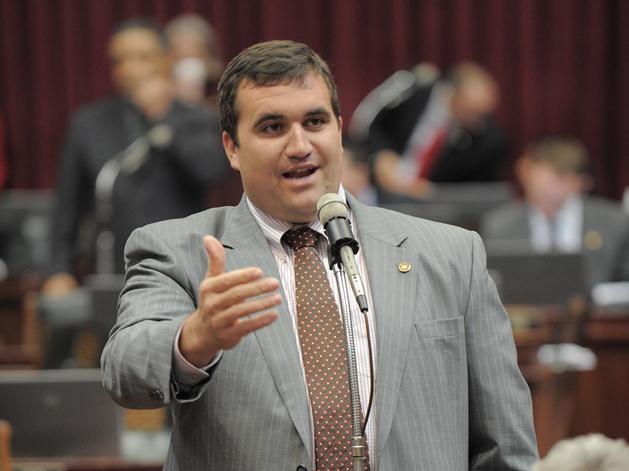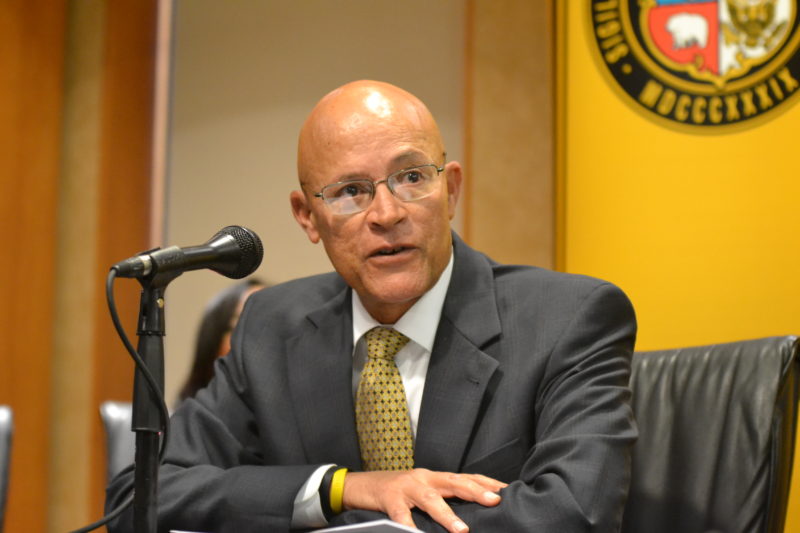COLUMBIA, Mo. – In a small, packed conference room in University Hall Thursday afternoon, filled with higher-ups, television cameras, reporters, students, faculty and members of the University of Missouri administration, Mike Middleton held a press conference to discuss his new role as the UM system’s interim president.
Middleton taught law at the University of Missouri in 1985 and retired as deputy chancellor on August 31 after serving in that role since 1998. He currently serves as a professor emeritus at the university’s School of Law, and he has served as a trial attorney in the Civil Rights Division of the Department of Justice
After the resignation of former President Tim Wolfe following a week of student protests and months of controversial decision making within the echelons of the university, Middleton said he was ready to move the university forward – a word repeated ad infinitum at the conference.
“I am honored to accept the appointment as interim president of the UM System and lead our state’s premiere university during this extraordinary time,” he said. “The time has come for us to acknowledge and address our daunting challenges and return our relentless adherence to the University of Missouri’s mission to discover, disseminate, preserve and apply knowledge.”
The board also named Hank Foley as the interim chancellor, taking over the position from Chancellor R. Bowen Loftin, effective immediately. Loftin and the board had commented earlier in the week that Loftin would “transition” out of the role sometime towards the end of the year, but the board made their move a bit quicker than anticipated.
“Our priorities have been to keep our campus community informed and safe and to make sure students, faculty and staff are aware of the many resources available to them in terms of counseling, mental health services and other support,” Foley said. “I am looking forward to working with Interim President Middleton and the other system chancellors to continue the forward progress at the University of Missouri.”
During the conference, Middleton spoke of the need for a more inclusive campus, in part by meeting with members of Concerned Student 1950, the student group advocating for greater rights and services for marginalized peoples on the Columbia campus. Middleton said in his time as a graduate student at Mizzou, he and the Legion of Black Collegians had submitted a list of demands for the university that eventually became part of the school’s modus operandi.
He said the members of Concerned Student 1950 had a right to have their voices heard.
“The demands that were most recently submitted involve complex interaction among many in this university,” Middleton said. “I intend to lead this university to satisfy each and every one of those demands that we can satisfy. The ones we don’t meet, we will explain why they can’t be met.”
Middleton, an African-American, was also asked if he believed his race had anything to do with his appointment to the role. He responded broadly on the topic of race, but eventually stated that it had probably played a factor.
“It’s reflective of the institutional racism we are trying to get beyond,” he noted. “I expect that my color will be met with much criticism from parts of our community. I also suspect my color was a factor in the judgment that I was a person, at this time, to take this position. Color in this country is an issue that is considered, that affects many many decisions that are made, positively and negatively. We need to understand that, accept it and get beyond it eventually.”
Also asked if he had ever felt marginalized in his time on campus, Middleton said, “Every day.”
“It’s so subtle,” he continued. “I think women understand it. I think people with a sexual orientation that is not a male-centered perspective on sexuality understand it. I think other people of color understand it. I think folks in power, in the majority who have never lived it and never experienced it have difficulty understanding it the way those of us who have been minoritized do. But it is just a feeling of not being heard, not being respected, being placed at the margins of what’s really happening in the world. And it happens. It happens inadvertently. No one is to blame for this.
“I remember as a child, reading the Brown v. Board of Education decision, and there was a statement in that decision that segregation in public schools did damage to the hearts and minds of Negro children in ways unlikely ever to be corrected. I think they missed a point. Segregation in public schools, Jim Crow laws… slavery, that whole continuum did damage to the hearts and minds of all children in ways unlikely to ever be corrected.
“I sympathize with white people who don’t understand. I don’t blame white people who don’t understand. I blame our ugly history, and I think it’s important we learn that history… so we can get beyond that history and build the institution and the country we imagined rather than the institution and country that is.”
Middleton’s appointment was met with much fanfare and several ovations in the standing room only gathering of state and university officials. The chairman of the University of Missouri System’s Board of Curators, Donald Cupps, said Middleton would be an asset to the institution.
“Mike Middleton is the best person to lead the system during this critical period of transition, with 30 years of leadership experience on the MU campus and past service as a civil rights attorney,” he said. “Mike’s outstanding managerial skills and knowledge of the UM system and its four campuses make him the leader we need to advance our university system forward.”
Though not in attendance, Gov. Jay Nixon sent his endorsement out in a statement as well while also asking the board to find Middleton’s permanent replacement.
“With interim leadership in place, I urge the Board of Curators to select a permanent president through a process that is thoughtful, transparent, inclusive, and efficient,” he said. “I look forward to working with President Middleton and his permanent successor to continue to improve higher education for the benefit of all Missouri students.”
Attorney General Chris Koster also sent along his well wishes to the appointee and his congratulations to the board.
“I have known Mike for twenty-five years, from his days teaching me criminal procedure in law school through his service as deputy chancellor emeritus of the Columbia campus,” Koster said. “His decades of leadership and familiarity with the University and its student body make him an outstanding choice to guide the institution through this period.”
U.S. Sen. Roy Blunt, R-Missouri, also sent along his congratulations to both Middleton and Foley.
“The University of Missouri has benefited tremendously from Mike Middleton’s leadership over the past three decades, and I believe his thoughtful and steady voice will be an asset throughout this transition,” he said. I am grateful to him, and to interim chancellor Hank Foley, for their willingness to lead as students, faculty, and administrators work to move the campus and the system forward. I wish them both the best in their new roles.”
Elected officials from the Columbia area were also optimistic. Reps. Caleb Jones, Kip Kendrick and Caleb Rowden all expressed their approval in the decision.

“It’s a great decision by the curators,” Jones said. “Mike Middleton has dedicated 30 years to the University of Missouri. I’ve known him for over a decade. He’s a true Missourian and a true University of Missouri supporter, and I think he’s going to move Missouri in the right direction. [He] will focus on getting to the root of the problem and figure out how to address any concerns students have about their safety.”
Rowden added that Middleton was exactly what the University needed after a hectic week in Columbia.
“When President Wolfe resigned, in his statement, he said, ‘We need a fresh start,’” Rowden said. “And I certainly think the combination of President Middleton and Interim Chancellor Foley provides that. Both are incredibly qualified brilliant men with a combination of a huge wealth of experience at this university and other institutions. It’s the right decision at the right time.”
Kendrick noted that he was grateful that Middleton decided to put off his retirement for the sake of the system.
“I know that he was looking forward to more time with family,” he said. “This is a tremendous sacrifice for him. It’s a difficult position to fill any time, especially right now. He’s been very active and engaged in the civil rights movement during his time. I think he’s going to help lead us forward to a brighter tomorrow.”
Middleton added that under his administration, there would be no shying away from difficult problems or conversations. He stressed education as his primary goal both in the sense of the university and in understanding the ills of society that have made themselves prevalent at the university for the past week.
“I have seen the system grow and excel over the years, and I look with great optimism to the future,” Middleton said. “To this end we must confront many uncomfortable societal issues that once confronted will make us stronger. We all know the university has faced its share of troubling incidents and we recognize that we must move forward as a community. We must embrace these issues as they come for they will come to define us in the future.”
Update (4:58 p.m.): With comment from Sen. Roy Blunt.




